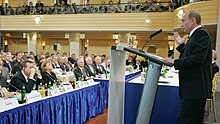This is an old revision of this page, as edited by Ssr (talk | contribs) at 06:37, 22 August 2021 (Undid revision 1040023943 by Ymblanter (talk) 1) "Russian press said" means "Russian press said" 2) These links were here since beginning 3) You remove Russian press after words "Russian press said" and "demand sources". It's very illogic. You don't have to behave illogicaly in Misplaced Pages). The present address (URL) is a permanent link to this revision, which may differ significantly from the current revision.
Revision as of 06:37, 22 August 2021 by Ssr (talk | contribs) (Undid revision 1040023943 by Ymblanter (talk) 1) "Russian press said" means "Russian press said" 2) These links were here since beginning 3) You remove Russian press after words "Russian press said" and "demand sources". It's very illogic. You don't have to behave illogicaly in Misplaced Pages)(diff) ← Previous revision | Latest revision (diff) | Newer revision → (diff)
| ||
|---|---|---|
|
||
The Munich speech of Vladimir Putin was a speech by Russian leader Vladimir Putin given in Germany on 10 February 2007 at the Munich Security Conference.
Putin used the speech to express significant points of the future direction of politics as it would be directed in Russia by himself. In subsequent years it received descriptions in the Russian press such as "iconic" and "prophetic".
Synopsis
Putin criticized what he called the United States' monopolistic dominance in global relations, and its "almost uncontained hyper use of force in international relations". The speech came to be known, especially in Russia, as the Munich speech. He said the result of such dominance was that,
no one feels safe! Because no one can feel that international law is like a stone wall that will protect them. Of course such a policy stimulates an arms race.
Putin also distorted a quote from 1990 speech by Manfred Wörner to create an impression that US made a binding promise not to expand NATO into new countries in Eastern Europe.
Response
In response, former NATO secretary Jaap de Hoop Scheffer called it, "disappointing and not helpful." The months following the Munich speech were marked by tension and a surge in rhetoric on both sides of the Atlantic, though both Russian and American officials, however, denied the idea of a new Cold War.
Putin publicly opposed plans for the U.S. missile shield in Europe, and presented President George W. Bush with a counter proposal on 7 June 2007 which was declined. Russia suspended its participation in the Treaty on Conventional Armed Forces in Europe on 11 December 2007 because:
Seven years have passed and only four states have ratified this document, including the Russian Federation.
Follow-ups
Putin later made other speeches that were called follow-ups to the Munich speech. These include:
- The Crimean speech of Vladimir Putin in Moscow, 18 March 2014
- The Valdai speech of Vladimir Putin in Sochi, 24 October 2014
- U. N. General Assembly speech in New York, 28 September 2015 ("I'm urged to ask those who created this situation: do you at least realize now what you’ve done?")
References
- www.rt.com/news/376901-putin-munich-speech-2007/ https://sputniknews.com/analysis/201602121034619188-putin-warnings-coming-true/
- ^ "Speech and the Following Discussion at the Munich Conference on Security Policy". kremlin.ru. 10 February 2007.
- Documents Talk: NATO-Russia Relations After the Cold War. https://pism.pl/publikacje/Documents_Talk_NATORUSSIA_Relations_after_the_Cold_War. ISBN 978-83-66901-61-0.
{{cite book}}: Check|isbn=value: checksum (help); External link in|publisher= - Watson, Rob (10 February 2007). "Putin's speech: Back to cold war? Putin's speech: Back to cold war?". BBC News. Retrieved 2019-06-10.
- "Munich Conference on Security Policy, As Delivered by Secretary of Defense Robert M. Gates, 11 February 2007". DefenseLink. United States Department of Defense. Archived from the original on 2007-02-14.
- "Press Conference following the end of the G8 Summit". kremlin.ru. 8 June 2007. Retrieved 2019-06-10.
- "70th session of the UN General Assembly". kremlin.ru. 28 September 2015. Retrieved 2019-06-10.
See also
This Russia-related article is a stub. You can help Misplaced Pages by expanding it. |
